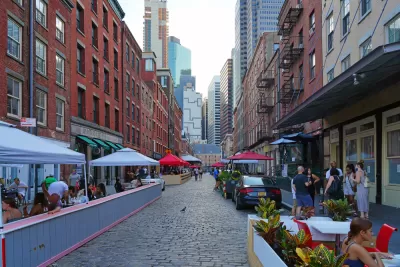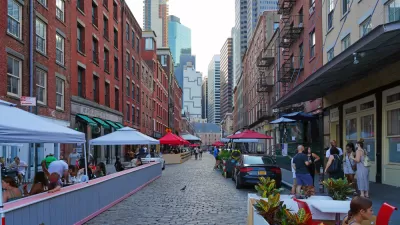The ongoing political controversy about the priorities of the public realm in New York City is likely to last into the next mayoral administration.

Winnie Hu reports that New York City's ongoing battle over the public space reclaimed from automobiles during the pandemic is likely to be determined by the next mayor.
As Planetizen has detailed repeatedly during the pandemic, New York City has led the charge of cities turning over street and parking spaces to human-powered uses like open streets for walking and playing, outdoor dining, and new dedicated bus lanes. While the empty streets of the early pandemic created an opportunity to repurpose space previously devoted to automobile travel and storage, the stage for the current conflict was being set by record levels of New Yorkers buying new cars during the pandemic.
George Arzt, a political consultant and former press secretary to Mayor Edward I. Koch, is quoted by Hu explaining that the controversies surrounding car space in the post-pandemic city is creating "a real migraine" for the city's mayoral candidates as the Democratic primary, scheduled for June 22, approaches.
Meanwhile, traffic safety in the city, like the rest of the nation, got worse in 2020 and continues to see heightened levels of danger in 2021. According to Hu, "There were 99 traffic-related fatalities reported as of May 31, the highest number in that five-month period since 2013…"
To get a better idea of how each of eight leading candidates for the office of mayor would act regarding cars, traffic safety, and transportation equity, Hu and the New York Times sent written questions, summarizing the answers in the source article below. Hu reports universal support among the respondents for congestion pricing and additional bike lanes as well as mixed support for the expansion of the Citi Bike shared-bike system and the expansion of the city's open streets program to low-income and minority neighborhoods. Hu also shares responses to questions about curb management and traffic safety technology.
FULL STORY: Whose Streets? The Next New York Mayor Will Have to Decide.

Planetizen Federal Action Tracker
A weekly monitor of how Trump’s orders and actions are impacting planners and planning in America.

San Francisco's School District Spent $105M To Build Affordable Housing for Teachers — And That's Just the Beginning
SFUSD joins a growing list of school districts using their land holdings to address housing affordability challenges faced by their own employees.

The Tiny, Adorable $7,000 Car Turning Japan Onto EVs
The single seat Mibot charges from a regular plug as quickly as an iPad, and is about half the price of an average EV.

Seattle's Plan for Adopting Driverless Cars
Equity, safety, accessibility and affordability are front of mind as the city prepares for robotaxis and other autonomous vehicles.

As Trump Phases Out FEMA, Is It Time to Flee the Floodplains?
With less federal funding available for disaster relief efforts, the need to relocate at-risk communities is more urgent than ever.

With Protected Lanes, 460% More People Commute by Bike
For those needing more ammo, more data proving what we already knew is here.
Urban Design for Planners 1: Software Tools
This six-course series explores essential urban design concepts using open source software and equips planners with the tools they need to participate fully in the urban design process.
Planning for Universal Design
Learn the tools for implementing Universal Design in planning regulations.
Smith Gee Studio
City of Charlotte
City of Camden Redevelopment Agency
City of Astoria
Transportation Research & Education Center (TREC) at Portland State University
US High Speed Rail Association
City of Camden Redevelopment Agency
Municipality of Princeton (NJ)





























